Meet your new Dallas
Morning News Staff Writer
I'm taking a gig at my hometown paper in an era when local journalism is dying, and I couldn't be more pleased about that.
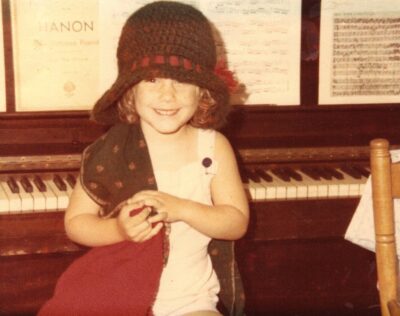
Dallas girl, circa 1979.
Growing up, I never wrote about Dallas. In the bedroom where I felt closest to happy, I scribbled stories on college-ruled notebook paper about a precocious girl in Maine (like Stephen King) or a troubled teen in Los Angeles (like the actresses I hoped to resemble) or a sophisticated woman in New York who probably did drugs (like everyone interesting).
I understood Dallas as the place I launched from, not the place I wrote about. I had imaginary interviews with Rolling Stone and People Magazine where I patiently explained how I’d fled Dallas as soon as I could, because that’s what plucky protagonists did in the movies. A young innocent must forge into the unknown to discover the larger world beyond (let’s say) NorthPark Mall and Pancho’s Mexican Buffet.
Eventually I would come to understand this as the “hero’s journey,” a term coined by Joseph Campbell and made legendary by George Lucas, who used the narrative structure to craft Star Wars, where Luke Skywalker ditched the sand-blasted terrain of Tatooine for those galaxies far far away. I would be next.
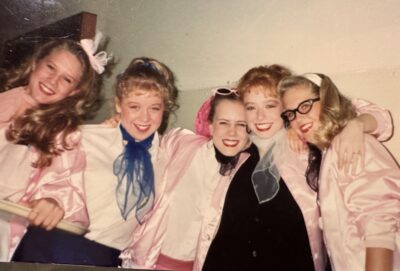
Theater dork, 1991, right there in the middle.
I wonder if part of my resistance to seeing Dallas as a place for writers is that, well, I didn’t know any. My friends’ fathers were real-estate developers and lawyers and real-estate developers (our town has a lot), while my own dad worked for the EPA. My mother was a social worker, and other working moms designed interiors and sold houses, though our section of Dallas was quite traditional, and most mothers stayed home, drove carpool, joined the Junior League. The single mother next door wrote a society column for the Dallas Morning News, and her closets filled with designer dresses and high heels (sorry, I snooped) for the galas and charity balls that were the year’s big events. I didn’t care about society. Or, to be more accurate: I didn’t care about that society.
I went to college in Austin, where the most famous writers were musicians, though I couldn’t help thinking half of them sounded like Stevie Ray Vaughn. I came back to Dallas in my late 20s, and I wrote about local music, and the bands I covered seemed to be suffering from chronic low self-esteem, though it’s possible I was projecting. Dallas was not Austin, a city with the chutzpah to name itself the Live Music Capital of the World, and Dallas was not Houston, a place so unique it gave rise to Beyonce. Dallas gave rise to Jessica Simpson and Pantera, but the musicians I loved were in the Wilco vein. I drank too much in smoky bars, sang along to broken-heart ballads, and if that sounds like I was more fan than critic, I probably was. The Old 97s wrote brilliant songs about Dallas, but by the time I got back to town, half of them had moved away. The best of the upstarts struck me as worthy of a national audience: Carter Albrecht (RIP), Trey Johnson (RIP), John Dufilho (thank you for sticking around). But I figured anyone who wanted to matter would have to push off their barstool and leave Dallas — so I did.
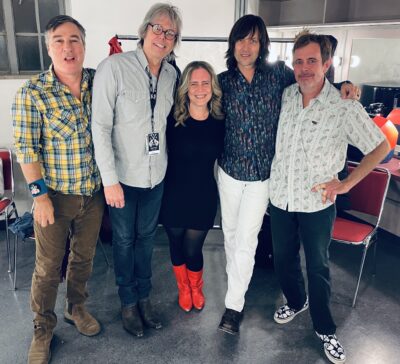
2022. Old 97s, thank you for your service.
I spent six years in New York, four more than I’d promised myself. I wrote for big publications, though I’d been doing that in Dallas, too, where rent was much cheaper. But I got to mingle and hob-knob with writers whose names I recognized from book covers and bylines — my kind of society — and though I learned a lot, one lesson I’ve neglected to mention is how it gave me an appreciation for writers back home. I didn’t see that much difference between the high-profile names I edited at Salon and the colleagues I’d joked around with at the Dallas paper. Well, I did see one difference: The high-profile names lived in New York. (Or Los Angeles, or San Francisco, or Chicago, though that was pretty much it.)
In 2011, I returned to Dallas once more, though I promised myself it was temporary. The whole point had been to launch from this place, not come back with my tail between my legs. I was 36, newly sober, lost in the world. I kept talking about moving, but I kept staying in place, though I began to see that Dallas was a town worth writing about after all. I penned a column about the city’s beauty culture for D Magazine called “The Smart Blonde.” I wrote an essay about finally learning to shoot a gun for the Dallas Morning News.
That essay had the same thrust of nearly every essay I would write about Dallas: An outsider who once rejected hometown rituals had become a woman curious what she’d missed along the way. I was trying to find peace — with myself, with my childhood, with the city I did not leave after all, because cheap rent is essential to a creative life, one reason the coastal writers have to hustle so hard or gain access to trust funds and rich spouses. In 2015, my book came out, and I gave phone interviews to journalists who sometimes asked about living in Austin. But I didn’t live in Austin, I explained. I lived in Dallas, and in the awkward silence that followed I filled in the obvious follow-up: But why?
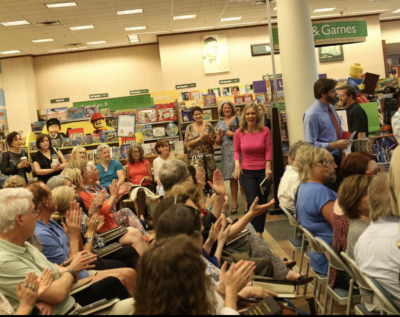
2015, “Blackout” event at Dallas’ Barnes & Noble.
Austin had become the artistic hub, the approved city, assumed home to Texas’ creative class. Richard Linklater, Lawrence Wright, Elizabeth McCracken, Ernest Cline. Dallas did have writers, excellent ones. Ben Fountain was a national book award finalist for Billy Lynn’s Long Halftime Walk, an epic that took place at a Dallas Cowboys game. Skip Hollandsworth is the father (or at least benevolent uncle) of Texas true-crime, with an archive that brought us Bernie, the soon-to-be-a-hit Hit Man, and more episodes of My Favorite Murder than I’d care to count. But I wouldn’t be surprised if those two got asked about living in Austin. Why didn’t they live there? As if a creative life would be best-served by caving to stereotype.
I love Austin. I visit often and spend half the time wondering why I don’t live there and the other half wondering what happened to the slacker valhalla that used to feel like home. But my best stories over the past decade came to me because I lived here, not there: A podcast on the Dallas Cowboys cheerleaders, the profile of a woman who lost both children in a fire set by her ex, an essay about real-life cowgirls that told the story of a woman named Mama Sugar who worked the land as a girl, rode a homemade wagon with a mule out front like other kids ride a bike. That last one was nominated for a national magazine award, the kind of brag I desperately wanted in my New York years, but it wasn’t until I left New York, came back, that I got it.
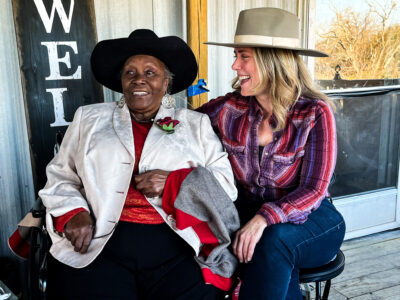
2022. Me and Mama Sugar.
“A hero’s journey” is about launching outward, but it’s also about circling back. People talk less about that part: The return. The path is not an arrow but a circle; you trace your orbit of derring-do till you land in the place where you started with more wisdom, more bruises and, if you’re like me, more credit card debt. But it strikes me as nuts that I once considered Dallas a place you don’t write about. Do you realize who lives in Dallas? Mark Cuban, George W. Bush, Jerry Freaking Jones.
Dallas may not be a literary capital (though props to Will Evans and many others working to make it competitive), but we have the best characters. Stormy Daniels, Harlan Crow, Glen Beck. We have Luka and Dak, sure, but also a trail of Hall of Famers I’ve run into at the gym, back when I could afford a membership: Troy Aikman, Emmitt Smith, Dirk Nowitzski, Michael Irvin. Roger Staubach is kicking around somewhere (real-estate developer). But it’s not just sports. Erykah Badu lives here, God bless her. Robert Jeffress and TD Jakes broadcast to massive audiences from their Dallas megachurches. Conservative firebrand Stephen Crowder lives here, even if the 5.7 million subscribers to his YouTube channel probably don’t know it. I haven’t even mentioned the galas and charity balls where the billionaires (yes, plural) mix and mingle and likely swap funny anecdotes about private jets in line for the bathroom. From a writer’s perspective? What we have here is a land grab.
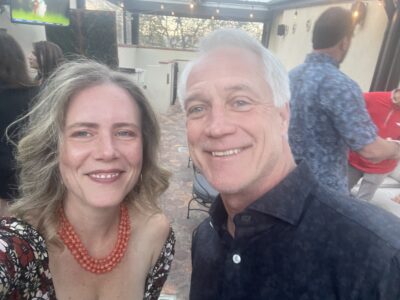
Darrell “Moose” Johnston, at the 2022 launch of EIGHT beer from Troy Aikman, who told me that night he’d put out a non-alcoholic version. Don’t make me call you a liar, Troy.
2024 is not a peak time for local papers. Pretty much any year this century has not been glorious for the beat reporters and city columnists and art mavens whose role, once upon a time, was to take the pulse of a city, unless that city happened to be New York and that paper happened to be the New York Times. But 2024 has been particularly brutal. The Los Angeles Times, once thick enough to double as a doorstep, has become a slip of thing, shedding 115 journalists in one blood-letting. The Baltimore Sun, once-home to Wire scribe David Simon and legendary satirist HL Mencken, changed hands and cut salaries, leaving its future in question. An average of five local newspapers close every two weeks, according to the New York Times, a statistic that sounds unreasonably high to me, though the drumbeat of doom has gotten so loud that people seem surprised to discover they even have a local paper, like learning that Radio Shack is still in business.
Dallas has a local paper. It used to have two, back in the go-go days of the 80s Newspaper Wars, but the Times Herald folded in 1991, and the Dallas Morning News thrived, going on to win a Pulitzer in 1992 (investigative reporting), 1993 (spot news photography), and 1994 (explanatory journalism). Not bad. The last 20 years brought fewer Pulitzers, more cutbacks, the shuttering of satellite offices, an experiment in cool-young news called Quick that could never punch as hard or as fast as the Internet, which was clobbering all print competition. This is not a local story, it’s a national one, a financial kneecapping that has cratered even the digital upstarts that once posed the biggest threat. Vice, Pitchfork, Jezebel, BuzzFeed news, no more. The Internet gave us the news for free, but it cost us. Unclear, as of this moment, how much we’re willing to pay.
On Tuesday, February 27, I start a gig as a features staff writer for the Dallas Morning News. My beat, according to the job description, is “Dallas’ big personalities, its lively scenes, and the insider stories that get people talking.” No lack of material there. It’s been more than a decade since I’ve been on anyone’s payroll, even longer since I went to an office. I’m excited about the first part, worried about the second. I spend most mornings typing in bed next to the warm and purring cat, still wearing what I slept in. This is a distant planet from “business casual.”
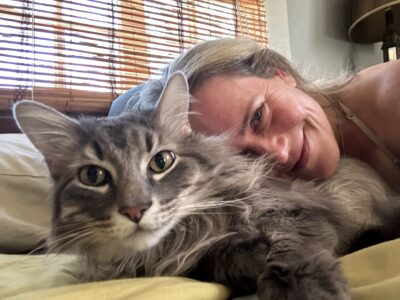
2024. “Office space.”
One cool side note is that I still get to write the occasional piece for other publications. Texas Monthly and Texas Highways have been good to me in these lean-freelance years; I have no plans for exile. In fact, I have two stories in the pipeline at Texas Monthly, one past late deadline at Texas Highways (it’s coming, Mike), and I’ll keep doing my culture podcast with Nancy Rommelmann, Smoke ‘Em If You Got ‘Em, though I’m under strict employee guidelines not to talk about elections or horse-race politics, what a gift. No Trump or Biden rants? You got it, boss.
What I get is to be an explorer in my hometown. To launch into the strip malls and suburbs and the tony parts of Dallas and the neighborhoods where people park their trucks on the lawn, and I get to ask questions. I’m literally paid to do this. I hope to bring news of this world to the subscribers of the Dallas Morning News, because the paper has many, and though subscribing to anything — a newspaper, another Substack, Paramount+ — has become a modern irritant, the free lunch buffet of the aughts replaced by the annoying pay wall of credit card info and yet one more password to forget — I hope some folks who follow my work might join me. At the least, I hope you’ll watch from afar.
Maybe I can convince skeptics that Dallas is indeed a good place to write about. Maybe I can convince people in Dallas that learning about your city isn’t just a distraction from the clown car of national politics and culture-war divisions, it’s a salve. See, I’m convinced that part of what ails our country right now is the way we argue across state lines, flinging ugly stereotypes and drive-by insults at folks we will never run into at Pancho’s Mexican Buffet (still around, raise the flag). We invest so much rancor in a presidential election whose outcome we have almost zero influence over (at least in Texas) and meanwhile, who’s the mayor? Eric Johnson, by the way, and he’s having quite a month. The over-investment in Washington narratives, the lack of investment in local ones: It’s a problem. I know this, because it’s a problem for me.
One of the great adages of literature is “write what you know.” One of the great adages of journalism is “Ask questions.” I plan to do both.
In summary: Mark Cuban, let’s talk.
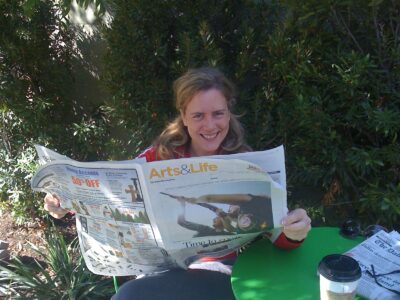
2012. Klyde Warren Park.
